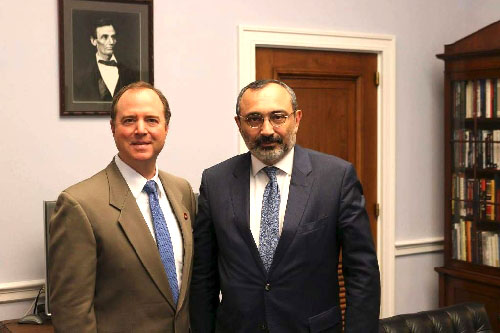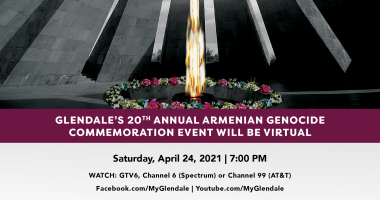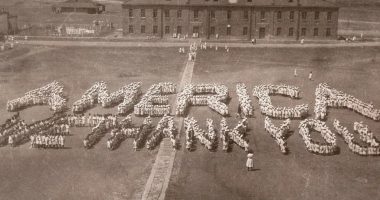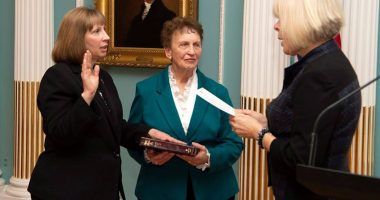By Danielle Saroyan
WASHINGTON, DC — U.S. House Foreign Affairs Committee Chairman Ed Royce (R-CA) called on the U.S., Russian, and French mediators to press Azerbaijan to accept major safeguards against intensifying ceasefire violations in the Nagorno Karabakh Republic (NKR) conflict zone while speaking at the 24th anniversary of NKR independence celebration on Capitol Hill this week.
Rep. Ed Royce also said on Wednesday that the U.S. administration must not shy away from blaming Azerbaijan for deadly fighting along “the line of contact” around Karabakh.
“Why are the snipers not pulled back from the border?” Royce asked. “Why have we not deployed those [gunfire] direction finders, that special equipment? They can tell where an incoming shell is coming from and identify that and thus be able to catalogue violations of the peace?”
“Why haven’t those in the Minsk Group moved forward to endorse this?” Royce added, referring to the mediating body co-headed by diplomats from the United States, Russia and France. He said he and several other members of the U.S. House of Representatives hope to discuss the matter with U.S. OSCE Co-Chair Ambassador James Warlick early next week.
Warlick attended the annual Capitol Hill event co-hosted by the U.S. Congressional Caucus on Armenian Issues, Armenian Assembly of America, Armenian National Committee of America, U.S. Office of the Nagorno Karabakh Republic (NKR), and the Embassy of Armenia in the U.S. Armenia’s Ambassador to the U.S. Tigran Sargsyan, NKR Representative to the U.S. Robert Avetisyan, former U.S. Ambassador to Armenia John Evans, and many others attended the Capitol Hill reception as well.
Hours before the Capitol Hill reception, Azerbaijan’s military again launched an attack on Nagorno Karabakh, this time using heavy tank fire for the first time since the ceasefire was signed in 1994. U.S. State Department spokesman John Kirby called the increased attacks and Azerbaijan’s use of heavy weapons “unacceptable.”
During the “Freedom and Democracy of the Nagorno Karabakh Republic” event on Capitol Hill, House Intelligence Committee Ranking Member Rep. Adam Schiff (D-CA) expressed his concern with Azerbaijan’s aggressive and dangerous military provocations, as well as current U.S. policy.
“I also raised my dismay that the response from the United States has been to draw a false equivalence between Azeri and Armenian behavior,” Rep. Schiff said. “As we pursue a peaceful settlement, we cannot ignore the bellicose rhetoric and provocative military actions by Azerbaijan. Our silence only emboldens them.”
Earlier this year, Royce initiated a joint letter signed by 85 U.S. lawmakers to Warlick, listing three concrete measures which they believe would minimize truce violations in the conflict zone. Those suggestions include sniper withdrawal, deployment of more field observers from the OSCE, and installation of gunfire-locator systems on the Karabakh frontline. Warlick reportedly backs the proposed safeguards.
The letter campaign began after mortar fire from Azerbaijan on September 24th killed 3 Armenian women aged up to 94. Azerbaijan military actions over the following days resulted in several deaths in Armenia and along the line of contact between Nagorno Karabakh and Azerbaijan. Within 24 hours of the letter’s issuance, OSCE monitors came under gunfire ascribed to Azerbaijan. “During our Line of Contact crossing, repeated gunfire forced OSCE monitors to take cover. This is unacceptable,” Ambassador Warlick, tweeted on October 27.
The Minsk Group co-chairs have long been urging the parties to the conflict to withdraw snipers and agree to a mechanism for international investigations of armed incidents. These measures are backed by Armenia and Karabakh but rejected by Azerbaijan.
Royce insisted on Wednesday that the “common sense steps” advocated by him and his colleagues would not only prevent more bloodshed but also “reinvigorate negotiations” on a Karabakh settlement. “And then the leaders of the Minsk Group can press Azerbaijan to fully pull back those snipers from the Line of Contact,” he went on. “And they can accurately identify who violates the ceasefire with artillery fire.”
“Once we accurately identified who violated the ceasefire agreement, it is important that the international community has the courage to call out those responsible and hold them accountable,” he said. “And that means we must end our current U.S. policy of equivocation. We have to speak the truth regarding the perpetrator of each and every attack.”
Royce’s appeal followed a fresh escalation of fighting around Karabakh, which has left several Armenian and Azerbaijani soldiers dead over the past 10 days. Royce said that the truce violations pose a serious threat to the safety of Karabakh’s population. “This isn’t a theoretical threat,” he said. “Those of us who remember 1988 remember the [anti-Armenian] pogroms in Baku. We remember what happened in Sumgait.”
Rep. Royce has accused Azerbaijan of violating the ceasefire in the past. In an August 2014 statement, he also urged the Obama administration to help set a date for an internationally recognized referendum in Karabakh that would determine the territory’s final status.
The conduct of such a referendum is one of the Basic Principles of a Karabakh settlement proposed by the three mediating powers. The conflicting parties have for years disagreed on the date and other practical modalities of the vote.










